Following our recent killzone.com Guerrilla Dossier on the Black Hand, we’ve asked Art Director Roy Postma and Assistant Art Director Dan Calvert to tell us more about the creation and design of the radical Helghast subfaction from Killzone Shadow Fall.
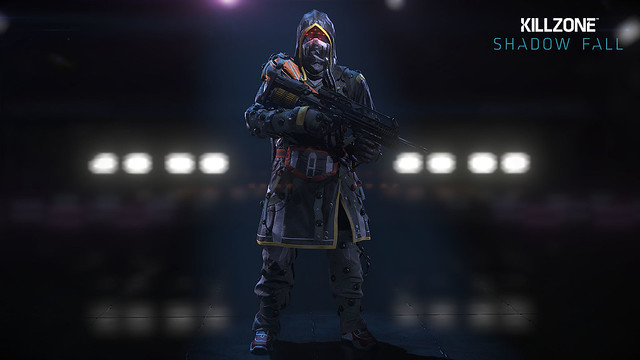
Click here to see the full gallery
Why do the Black Hand look so different from any of the foes seen before in the Killzone universe?Dan Calvert: We’re dealing with the universe-changing consequences of the demise of planet Helghan, plus the jump in time between Killzone 3 and Killzone Shadow Fall. We’d already started to see the Helghast fragment in Killzone 3 after Scolar Visari’s death, and the loss of their home and a vast part of their population only furthered this. The Helghast maintain their identity and their ideals, but their goals are now splintered. The Black Hand are the most divergent Helghast subfaction we see in Shadow Fall; they’re not a regular army, and they don’t use conventional warfare tactics. They’re infiltrators, not invaders.
Roy Postma: From a design standpoint, increasing the diversity between the characters was a clear choice we made from the start. Instead of constraining ourselves to the Helghast military, we expanded the range of enemies to different groups, from security to the military to special ops and the Black Hand. This allowed us to create a unique and distinct basis for each group, which we finished off with the typical Helghast details to ensure no-one would mistake them for friendly forces.
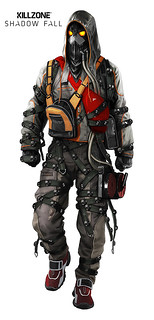
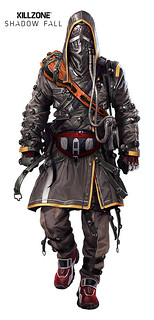
Roy Postma: The Black Hand are a good example of the setting of our new world, where Vektans and Helghast live next to each other with only a wall dividing them. Their costumes are a crossover of design elements from both main factions, combined into a whole new look. Like Dan said, the Black Hand are not an official army – they’re not equipped like regular soldiers. They hide and live among civilians until they’re activated, so the basis for their costumes is Vektan civilian street wear.
When Black Hand operatives get called into action they will pull up their hoods with the red combat goggles to hide their identity, and gear up with surplus Helghast military gear smuggled over the wall. The most noticeable elements in their equipment are the straps they wrap around themselves. On these straps they’ve fastened cloaking projectors, similar to the ones used by Helghast snipers. The Black Hand use older models, which means they need a lot of projectors strapped around their bodies, but this renders their combat gear practically invisible to the naked eye. It lets them to blend in and get close to their targets before they spring into action.
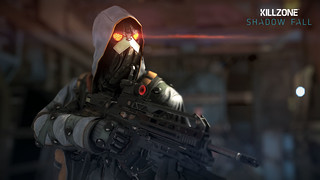
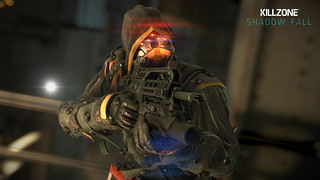
At its core, the identity of the Black Hand is defined though chaos. Their goals are to unsettle the Vektan populace with random attacks. Chaos is their manifesto, so it’s something we express through their character design – the mismatched clothing, the haphazard gear and bags, the loosely attached projector straps that flail around as they move – none of this is detail for its own sake, it’s there to show exactly how these guys are different in character from your typical Helghan infantryman.
How has developing for a next-generation platform enhanced the character design and authoring process?
Dan Calvert: There were a couple of important things that we wouldn’t have been able to achieve on older consoles, and if we’d lost these they would have really compromised our vision for the Black Hand. Having all those loose-fitting elements move naturally, respond to the motion of the character, and collide with one another would have been impossible without the advances in our simulation and character rigging.
In addition, we’ve become a lot better at cloth and civilian-style clothing – instead of sculpting the character’s clothes out of digital clay, we now cut and sew digital clothing patterns and then precompute how they would hang on the character to get the most natural folds and seams possible. We’ve also improved our ability to render cloth-like materials and simulate in-game cloth behavior.

Thanks Roy and Dan! Check out the gallery below for concept images for the Black Hand operatives, and keep an eye on Killzone.com and PlayStation.Blog for new Guerrilla Dossiers coming soon!
